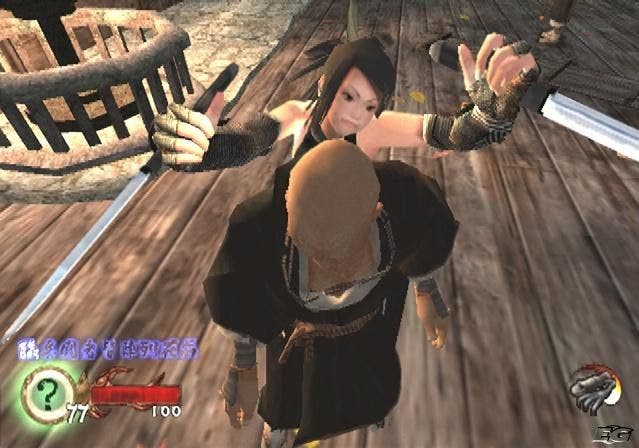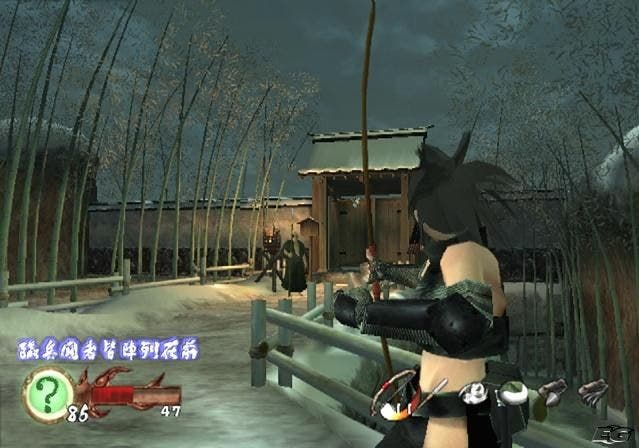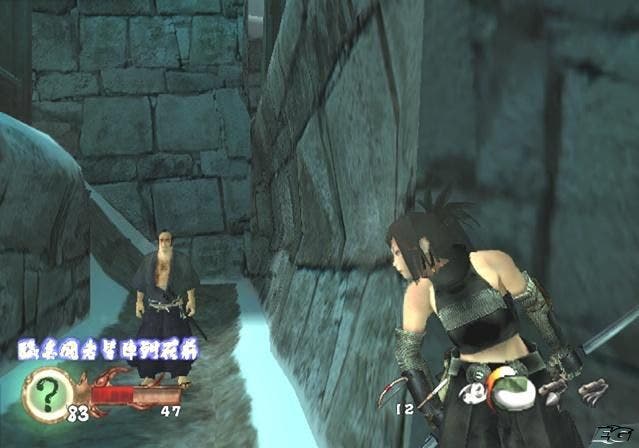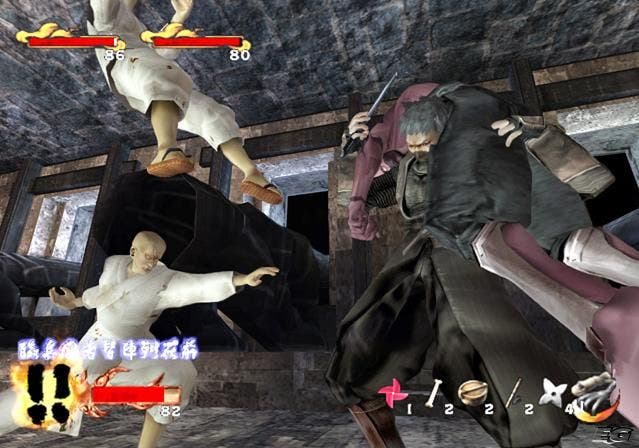Tenchu: Wrath of Heaven review
Review - Activision pulls its finger out, Tom pulls his sword out
Back in the day, automated AI sentries went off like car alarms if you got within 50 yards. Their all-seeing eyes were enough to pierce the backs of their own heads, pools of water, wooden doors, metal constructions and even time as they annoyed the hell out of cautious players and exhibited 'artificial intelligence' to frighten even GM crops. But whichever boot camp it was that pissed forth these furious vesicles of world domination, banana theft or whathaveyou, it must have been shut down oh so long ago, because these days the average grunt makes no effort to sprint, all guns blazing into the jaws of my sword, preferring instead to flail about uselessly in the dark until mercifully dispatched.

Forget it
Tenchu is built on the principle of stupid, logic-defying guards with attention spans a three-year-old would be ashamed of. Much of the game is spent evading their gaze, but even if you happen to make it into their sights, you can avoid most battles by grappling your crooked way to the rooftops, or simply running out of sight. Upon doing so, your little 'worry meter' in the bottom left will go from red alert to a vague question mark, before returning to its numeric threat measurement as the latest porky, robed stick-wielder snaps "ah, forget it!" Only boss encounters truly bind you to combat.
Of course, the reason you want to stay out of sight is because it's better to kill them by surprise. While it's true that you can run up to the average guard and chop away at him with a sword, knife, stick or even bare-fist combo, the idea is to stay out of sight, creep up on the oblivious automaton and then perform a stealth kill; slitting his throat, chopping his head off, disembowelling him, snapping his neck, brutally eviscerating him whichever way is convenient, cracking his skull or even jamming pins into his head. Upon doing so, the game rewards you with a kanji symbol in the bottom left - the idea being to collect nine for each level to unlock some new ability, like a shoulder charge.
And the more stealth kills you can manage and the fewer times you're seen, the higher your eventual score and rank will be - can you become a Grand Master? What's more, you can play any of the game's levels (nine each for the two central characters Rikimaru and Ayame, and six for unlockable Tesshu) with two further guard layouts, unlocked depending on your rank at the end of your first go.

Tools for ghouls
Your activities in this first PS2 Tenchu are hugely varied. You'll face one of three narratives, in the roles of Rikimaru, the freshly woken ninja on a quest to rid the land of evil, Ayame, a knife-flashing lady assassin, or Tesshu, doctor by day and cold, methodical assassin by night. Each has various in-game cut sequences, similar levels and confrontations, but enough variation to keep you interested. Indeed, the first open-plan, roof-hopping level, which has you fighting to assassinate a dodgy minister and his kiddy-fiddling nobleman friend, can be played a total of nine different ways, taking into account the different guard layouts available to each player and the subtle changes made between campaigns.
It's a decent setup, augmented by various abilities and pieces of equipment, like the aforementioned grappling hook - devilishly useful where rooftop reconnaissance and attacks from above are possible. Other aspects of your assassin's arsenal include various spiked distractions, like poisoned rice balls, grenades of every kind, the odd blow dart for those situations you can't quite get to, a number of throwing knives (which were throwing stars to begin with, but were stripped away in line with European law - still useful for taking out dogs which threaten to bark your whereabouts), strength and health potions, rice beads to mark your progress on the map like Hansel and Grettle, and even a Scorpion-from-Mortal Kombat style device for pulling enemies into reach of your sword. It's a goodly mix, and you can pick up far more - including single-use weapons pinched from dead guards. Cleverly though, you can't take everything into battle - the game will limit your selections, and in Tesshu's case you have to find money to keep buying them. There's no cushy government perks in his job.

Easy bleeder
All of this is helped immensely by a simple, manageable control system. The lack of a proper (playable) tutorial is a bit of a pain, but the video segments available from the main menu should tell you all you need to know - it's a two stick (left control, right camera) system, with the usual options; jump (X), block (circle), attack (square), use (triangle), inventory cycle (L2), first person camera (L1), lock on to enemy (R2), map (select) and pause (start). However, there's a wildcard in the shape of the "stealth button", R1. Holding this crouches you down, allowing you to perform a stealth kill with square when you get near an enemy (this is true of aerial proximity too), various rolls (X), special attacks (circle) and so on. It is the key to progress.
Sadly though you will be regularly thwarted by a typically unhelpful camera. Unlike The Mark of Kri, released on Friday, Tenchu's camera will not swing into a helpful overhead viewpoint when an enemy is below you, or find a comfortable position in any case. It sticks to your arse most of the time, but it has a habit of forcing you to twiddle the right stick far too much, and using the L1 mode to have a snoop around requires very precise control of your ninja. Fortunately you can't easily be seen with the stealth button depressed, nor can you stumble from rooftops, so you can squirm your way right to the edge to get a good look - but why should you have to? A bit of thoughtful design here might have done wonders - equally so in combat situations, which you'll avoid partly to kill stealthily and partly because the camera is totally unwieldy.

Rebirth
However, on the whole, Tenchu is a varied, enjoyable and exciting game then, with a few flaws to speak of. Our only other two were the occasional black pit ending your progress (unbelievably annoying midway through a level if you've no "Ninja Rebirth" item), and the presence of ghosts. Why do we need spectral enemies in every game ever, now? Eh? Those issues aside, you certainly can't fault the visuals, though, which offer up beautifully crafted main characters with an abundance of different, slaughterous animations, many different environments from the sharply featured temples and ornamental gardens to the snowy bamboo forests and intricate paper-walled confines of various houses, castles and retreats. Nor can you fault the plot, which is different in each case - Rikimaru and Ayame fight mostly the same battle, culminating in a showdown with Tenrai, but Ayame is trying to recover the Jewels of Power, and Tesshu has an altogether different finale ahead of him in Ronin Village. It's "short" in single-minded terms, but any gamer with enough might to defeat one campaign will quickly set upon the next.
Not content with that, either, K2 has thrown in a saucy co-operative mode. This is a real blast, as you control two ninjas in various specially generated levels that demand protection, retrieval and other combined skills. One of you may need to cause a distraction while the other ghosts in for the kill, and given a few hours this is a great mode to play. You can even dress up as a lot of unlockable characters, like guards, ninjas, dogs and even a suited fellow with a mechanical arm… Our only gripe is that you can't take on the plot missions collaboratively, although we can understand why. Next time though, folks, let's have a proper co-operative campaign thrown in, eh?
Stealth conclusion
It all sounds jolly good, doesn't it? Nice plot, well designed characters, good control system, lots of variety, decent length and a wonderful co-operative mode, not to mention stealth kills, which bang any game's credentials into shape with a flick of the spine. However, existing fans may be concerned that the Wrath of Heaven doesn't really take the series forward to any great extent - and they'd be right. This is all fairly familiar, but the key thing is that it's new content, there are new challenges, it all looks spectacular and it'll last you for ages. Assuming those things matter to you, as well they should, Tenchu: Wrath of Heaven is a very good buy.
Tenchu: Wrath of Heaven screenshots (PS2)

